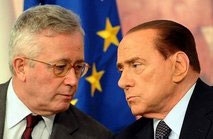Italy calls for emergency G7 to stem euro turmoil
 As Europe scrambled to head off pressure on the single currency zone, Prime Minister Silvio Berlusconi said after telephone talks with President Nicolas Sarkozy that G7 finance ministers would meet "in a few days".
As Europe scrambled to head off pressure on the single currency zone, Prime Minister Silvio Berlusconi said after telephone talks with President Nicolas Sarkozy that G7 finance ministers would meet "in a few days".
"The situation is very difficult and requires coordinated action. We have to recognise that the world has entered a global financial crisis that concerns all countries," Berlusconi said after talks with several European leaders.
Italy, which along with other euro giant Spain is in the eye of a financial storm, will speed up implementation of a package of austerity measures aimed at achieving budget balance, Berlusconi added after a wave of market panic.
Italian shares plunged over 13 per cent this week, while investors scared the country's slow growth means it will get caught up in a debt trap sold off their bonds, sending rates of return over 6 per cent.
The European Central Bank (ECB) however agreed Friday to start buying up Italian bonds from Monday in return for a promise from the government to accelerate deficit cuts, Italy's Federalism Reforms Minister Umberto Bossi.
"Everyone is afraid our bonds will turn into scrap paper but by returning to budget balance one year early, the ECB has guaranteed that from Monday it will buy our bonds," he said.
"For us it's a solution, a guarantee," said Bossi, who is also the leader of the Northern League party, the main partner in Berlusconi's centre-right coalition.
In Washington, the White House said President Barack Obama had discussed the crisis with Sarkozy and German Chancellor Angela Merkel in separate phone calls.
Obama "welcomed the continued leadership of President Sarkozy and Chancellor Merkel in addressing the challenges facing Europe's economy," a White House statement said.
Seeking to soothe tension after contagion even began to threaten France on the bond market, the EU's economic affairs commissioner Olli Rehn rushed back to Brussels and announced he will propose new, common "Euro-bonds" next month.
Until now taboo, these would allow eurozone governments to raise funds needed to run their countries based on guarantees from the entire 17-country bloc of 332 million people.
Merkel, Spanish Prime Minister Jose Luis Rodriguez Zapatero, as well as Sarkozy, Berlusconi, and non-euro leader British Prime Minister David Cameron, launched a flurry of phone discussions, also involving EU president Herman Van Rompuy.
Rehn insisted the input of G7 and G20 partners will be of "critical importance" in wider efforts to resolve the spiralling chaos, and said the small print on the new funds and powers would be ready "in weeks, not months."
But China said debt deals in Europe and the United States, where the permitted ceiling was again raised, would not be enough to save their respective economies.
"Concrete steps" must be taken to rebalance the global economy, said a commentary published by the official Xinhua news agency.
It recommended troubled eurozone countries look to reforms not bailouts.
British Foreign Secretary William Hague called a crisis meeting there, saying London would take the "necessary action" to combat the crisis engulfing its biggest trading partner.
The European Commission, the European Central Bank and the European Financial Stability Facility (EFSF) are each "working night and day to put flesh on the bones" of an agreement struck at a July 21 summit.
Rehn maintained he did not believe Spain and Italy, the two core countries most under pressure, would need a financial rescue -- even if bailout funds may eventually need to be increased.
Both nations have committed to budget cuts and reforms, for example of labour law, he noted.
The July emergency summit was called over fears the Greek debt crisis could spill over to the eurozone's third- and fourth-largest economies.
Greek Prime Minister George Papandreou urged leaders Friday to nail down the details "now" of the second Greek rescue. Under the July deal, the second bailout for Greece in just over a year, this time with one-off participation by the private sector, will amount to 160 billion euros ($226 billion).
Hundreds of billions of dollars in value were lost this week during a global stocks sell-off sparked by prospects of a slowdown in the US economy as well as eurozone debt concerns.
What the stars mean:
★ Poor ★ ★ Promising ★★★ Good ★★★★ Very good ★★★★★ Exceptional
 Tag:
Tag:
Related Contents
Latest News
More News
- Russian President congratulates Vietnamese Party leader during phone talks (January 25, 2026 | 09:58)
- Worldwide congratulations underscore confidence in Vietnam’s 14th Party Congress (January 23, 2026 | 09:02)
- Political parties, organisations, int’l friends send congratulations to 14th National Party Congress (January 22, 2026 | 09:33)
- 14th National Party Congress: Japanese media highlight Vietnam’s growth targets (January 21, 2026 | 09:46)
- 14th National Party Congress: Driving force for Vietnam to continue renewal, innovation, breakthroughs (January 21, 2026 | 09:42)
- Vietnam remains spiritual support for progressive forces: Colombian party leader (January 21, 2026 | 08:00)
- Int'l media provides large coverage of 14th National Party Congress's first working day (January 20, 2026 | 09:09)
- Vietnamese firms win top honours at ASEAN Digital Awards (January 16, 2026 | 16:45)
- ASEAN Digital Ministers' Meeting opens in Hanoi (January 15, 2026 | 15:33)
- ASEAN economies move up the global chip value chain (December 09, 2025 | 13:32)






















 Mobile Version
Mobile Version